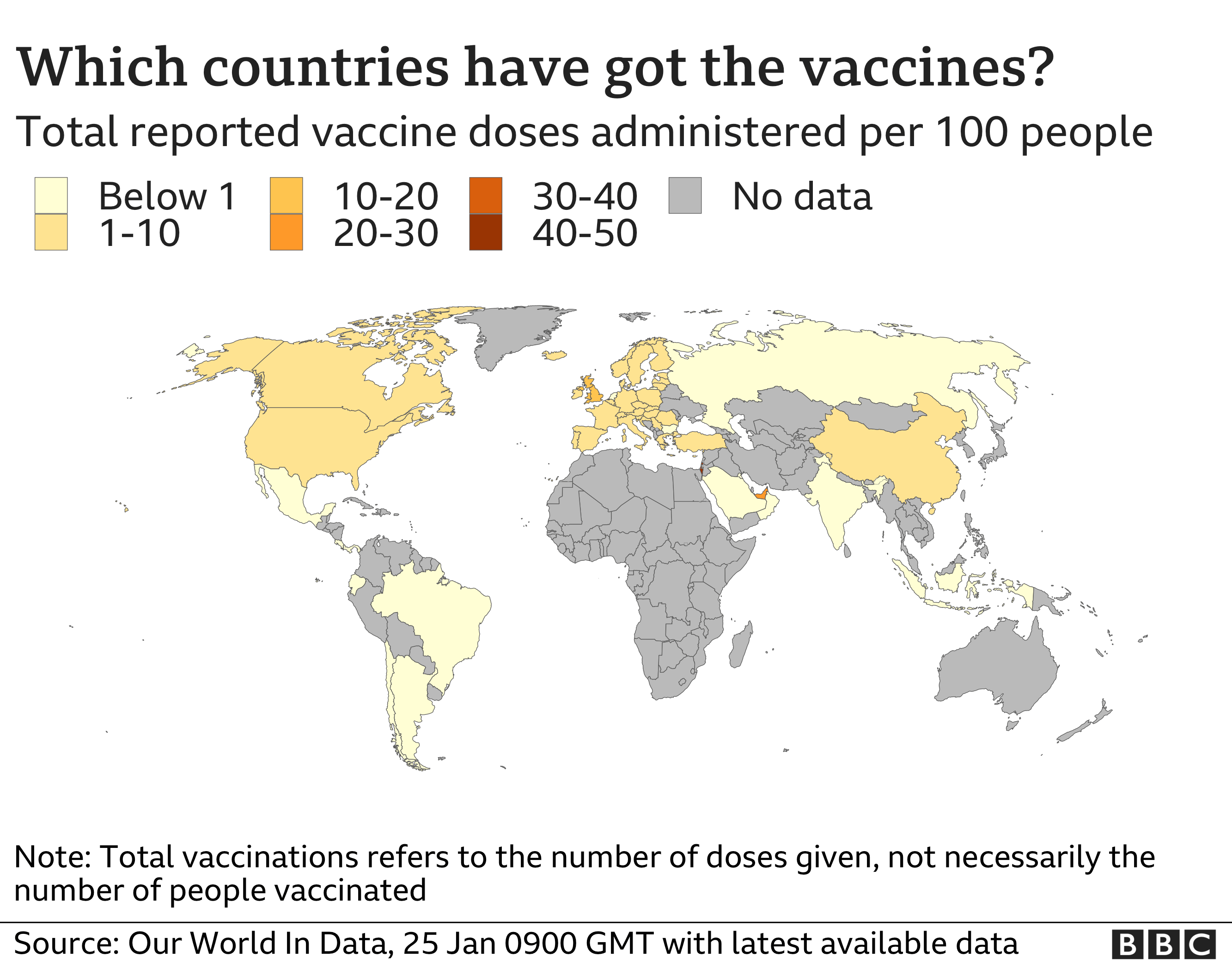EU AND ASTRAZENECA SEEK TO RESOLVE VACCINE CRISIS
The EU and the UK-based Covid vaccine maker AstraZeneca have vowed to work together to resolve a bitter row over supply shortages to the bloc.
AstraZeneca had agreed to deliver millions of doses in January-March but then said significantly fewer jabs would arrive on time. It blamed production problems at European plants.
The EU is demanding the firm divert jabs from the UK.
The UK government has said there “will be no interruption” to UK supply.
Cabinet Minister Michael Gove said it was “critical” to make sure that the “schedule that has been agreed and on which our vaccine has been based goes ahead”.
The EU signed a deal with AstraZeneca in August for 300 million doses, with an option for 100 million more, but the UK-Swedish company has reported production delays at plants in the Netherlands and Belgium.
AstraZeneca CEO Pascal Soriot said production was “basically two months behind where we wanted to be”.
UK factories have not experienced problems.
On Thursday, scientific adviser to the UK government Sir Jeremy Farrar urged against vaccine nationalism, saying “it doesn’t serve anybody to have these fights over vaccine supply”.
- What’s the problem with the EU’s vaccine programme?
- Vaccine plant evacuated over suspicious package
- The global plan to share Covid-19 vaccines fairly
The contract between the EU and AstraZeneca contains a confidentiality clause – but the EU has asked the company to release the details nevertheless.
The EU says the shortfall is greater than previous reports suggested. Instead of receiving around 100 million doses before the end of March, they are now expecting 25 million, one official said on Wednesday.
The AstraZeneca vaccine, developed with Oxford University, has not yet been approved by the EU, although this is expected on Friday.
The EU has been criticised for the slow rollout of inoculations for its population of around 450 million.
It has a much bigger vaccine deal with US-German vaccine-maker Pfizer-BioNTech but it is also facing delays in supplies.
The dispute comes as countries globally race to get their hands on vaccines to protect populations against Covid-19 and deal with the fallout of the pandemic.
What’s the latest in the row?
After crisis talks on Wednesday between the EU and AstraZeneca, EU Health Commissioner Stella Kyriakides expressed regret over the “continued lack of clarity on the delivery schedule”.
“We will work with the company to find solutions and deliver vaccines rapidly for EU citizens,” she tweeted.
An AstraZeneca spokesman said the company had “committed to even closer co-ordination to jointly chart a path for the delivery of our vaccine over the coming months”.
Before the talks, Ms Kyriakides insisted that UK factories were part of the EU’s deal with the company.
- Covid map: Where have the 100m cases been?
- Some symptoms ‘more common’ with new variant
In an interview on Tuesday with Italian newspaper La Repubblica, AstraZeneca CEO Pascal Soriot said the contract compelled it to make its “best effort”, rather than obliging it to meet a set deadline for delivery of the vaccines.
Ms Kyriakides said this characterisation of the deal was “not correct or acceptable”.
She added that the EU rejected “the logic of first-come first-serve”.
“That may work at the neighbourhood butcher’s but not in contracts, and not in our advanced purchase agreements.”
Ms Kyriakides appeared to be responding to Mr Soriot, who said that the UK had signed its contract with AstraZeneca three months before the EU and that this extra time had been used to “fix all the glitches we experienced” regarding the UK.
What are the supply problems?
The EU had hoped that, as soon as approval was given, delivery would start straight away, with some 80 million doses arriving in the 27 nations by March.
However the delays reported by AstraZeneca have dented that hope.
Italy was among the countries threatening to sue over the delays.
Officials have not confirmed publicly how big the shortfall will be, but Reuters news agency reported that deliveries would be reduced to 31 million in the first quarter of this year.
The EU has also ordered 2.3 billion doses of vaccines from four other companies, of which only those of Pfizer/BioNTech (600 million) and Moderna (160 million) have been approved.
Pfizer has not been able to supply the 12.5 million vaccines it promised the EU by the end of 2020, saying last week it was delaying shipments for the next few weeks because of work to increase capacity at its Belgian processing plant.
As a result of delays, Spanish officials said the Madrid region was halting almost all vaccinations for two weeks and supplies in Catalonia were also threatened.
The EU has threatened to restrict the exports of vaccines made within the bloc to deal with the shortfall.






